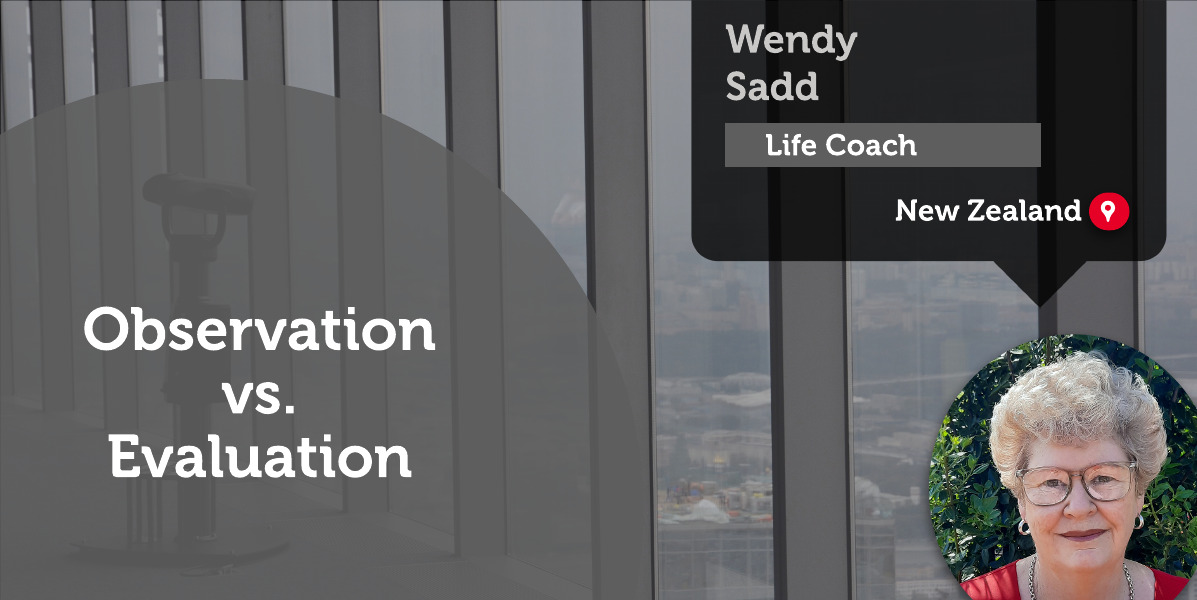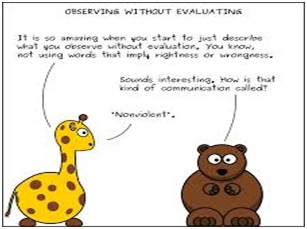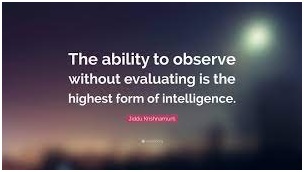A Coaching Power Tool By Wendy Sadd, Life Coach, NEW ZEALAND

Getting Started with Observation vs. Evaluation
We live in a culture of evaluations and judgments. They are incorporated into our language as words like faster, better, smarter, prettier.
We judge and evaluate to survive
That looks like a snake up ahead, so I run the other way and it wasn’t a snake up it was a piece of rope.

However, evaluations, when stated as facts, can often cause us problems in interpersonal relationships, because when we evaluate we interpret or judge a person, circumstance or ourselves, through our unique view or model of the world. These have been formed by our past experiences, beliefs, assumptions, perceptions, and expectations and these may not the truth of what may be going on.
Differences Between between Observation vs. Evaluation
The definition of the word Evaluation
A determination of something or someone, based on thinking, judging, interpreting and comparing
It is not easy to separate our evaluations from our observations, because we are conditioned to create our meaning about situations/circumstances, without knowing all of the facts.
Evaluation is subjective. The act of evaluating engages our mind and it interprets what we are observing and it produces a judgment.
Definition of the word Observation
The action or process of closely observing or monitoring something or someone
A statement based on something one has seen, heard or noticed
Observation is what we experience directly, with our senses. What we see, hear, smell, touch, and taste. An observation contains just the facts. Observation is objective.
Krishnamurti, the Indian philosopher, and spiritual teacher is known to have said that
Observing without evaluating is the highest form of human intelligence

This has been a real growth edge for me and I believe it’s an important skill to have as a coach. Something that has helped me, is the practice of Nonviolent Communication. (NVC).
Four years ago, I learned about the practice of (NVC) and became fascinated with the process that shows a way of being very honest, without criticism, insults, or put-downs and any intellectual diagnosis implying wrongness.
I have attended many NVC workshops and have been slowly integrating this model of Conscious Communication into my life and my ability to observe what is happening without evaluating has improved. Now, when I feel triggered or annoyed by the behavior of someone else or a situation, it reminds me to pause and get curious. I ask myself “what am I thinking about what’s going on?” and then I find I am judging and creating a disempowering story. I am still a work in progress and always will be, however, this process has increased my self-awareness and has made me a more peaceful person.
When we make evaluations in the form of judgments about other people, we are implying that there is something wrong with their actions and intentions and we project these onto others. Our projections can be perceived as judging, labeling, criticizing, analyzing comparing, or right/wrong. All these behaviors can lead to disconnection, defensiveness, resistance, and withdrawal of the other.
This is generally unproductive because we get what we don’t want instead of what we do want.
Communication will be more effective when we separate evaluation from observation:
Consider the following statement:
You’re lazy and only think about yourself
If I were to say that to someone, I am essentially saying something is wrong with your character. When I am speaking in that way, it is likely to create offense, resentment, and judgment back and that creates a dynamic that is unhealthy and unproductive.
A more effective way of addressing the issue would be to say “ I see that the rubbish has not been put out yet” and then you could have a conversation about getting the rubbish out and come to an agreement. The other person is more likely to co-operate because there is no evaluation of the situation.
Evaluating people and situations are likely to lead to judgments, which are detrimental to relationship building.
Examples of the Difference Between Observation vs. Evaluation
|
Evaluation |
Observation |
|
My client is ignoring me because I sent an email to them last week, requesting a response and they haven’t responded |
It’s been 5 days since I sent that email to my client and I haven’t received a response from them yet. |
|
My friend has rejected me because they said “NO” to my request to stay with her. |
My friend said “NO” to my request to stay. |
|
Johnny is such a slob, he never picks up after himself. |
Johnny’s clothing is on the floor. |
|
My friend doesn’t care about me, because she forgot about my birthday. |
It was my birthday yesterday and I didn’t hear from my friend. |
|
Julie is unreliable because she was 10 minutes late for the meeting this morning. |
Julie was 10 minutes late arriving at the meeting this morning. |
|
Peter is inconsiderate because he didn’t knock before he entered my office. |
Peter didn’t knock before he came into my office. |
Many of us have difficulty making observations without judging, especially when it comes to other people and their behavior. I think it’s really important for coaches to remind themselves that other people are different and that as a coach you need to meet your clients “where they are”, not where you think they should be or want them to be.
This reminds me of Milton Erickson’s Five Principles. I think they are extremely effective to keep in mind when coaches are engaging with their clients.
- People are okay as they are.
- People already have all the resources within them to achieve what they want.
- People always make the best choice they can at the time.
- Every behavior has a positive intent.
- Change is inevitable.
The more I can keep a relationship free of judgement and evaluation, the more this will permit the other person to reach the point where he recognizes that the locus of evaluation, the centre of responsibility, lies within himself. Carl R.Rogers
The coaching space between the coach and the client needs to be free of evaluations. This provides the psychological safety a client needs to feel safe to open up and share their innermost thoughts and feelings.
The coach can share observations because these create common ground, which helps the client remain open to clarification and serves to keep the doors to communication and connection open.
Observations also put the coach into a neutral space and when they are in this space, they can get curious about what they are observing if it’s appropriate to do so.
Evaluations by contrast can lead to common mental mistakes e.g jumping to conclusions before you have all of the facts, personalization, and blame, catastrophizing or minimizing a situation.
Earlier this year, I received a message from a woman on LinkedIn who didn’t know anything about me, other than what’s on my LinkedIn profile, which doesn’t say a lot. I don’t use it to promote myself. Her profile said she was a Therapist, Hypnotherapist, Holistic Counsellor, and Coach.
This is what her message said
Based on your profile it look likes you’re the type of person who might benefit from my work. I help female entrepreneurs and business women build confidence and eliminate limiting beliefs that have been holding them back from success,
Upon reading the message I laughed and thought gosh if I was looking for a therapist or coach, there was nothing about her message that inspired me to want to connect with her because I felt she had evaluated me, based on my LinkedIn profile and I felt judged.
A while back a client phoned me in a state of anger because they had been told by another professional that their business wasn’t doing as well as it ought to be and that they had paid too much for it. I had helped them to do the due diligence on the business before they purchased it. The clients had made an evaluation about my work, based on the words of a third party, and they were annoyed with me because on some level they thought I was to blame.
The experience reminded me about how uncomfortable it feels to be judged and blamed for something. It was challenging for me because it triggered some of my limiting beliefs, and it also allowed me to look at those beliefs.
I extrapolated the facts from the fiction in the situation and concluded that there were no facts, only judgments, and assumptions.
I then engaged with the clients and suggested that we observe the facts of the matter and once we had properly reviewed the situation, their fears dissolved, because the facts indicated that their business was doing very well.
Clients often make evaluations about their behavior, which can lead to self-judgments and assumptions that are not useful. Phrases, like “I am stupid”, or “I am a procrastinator”, “I should have done this or that” are disempowering. Drawing on the distinction between evaluations vs observations can be helpful to show the client that their behavior is the issue and their behavior does not define them, because it can be changed.
How good are you at determining the difference between an Observation vs. Evaluation?
What are each of these, an Observation or Evaluation.?
“You are so selfish”
“When I asked if you would take that phone call, you said you were too busy”
“You don’t listen to me”
“The grass on the front lawn is wet”
“That man is an inconsiderate buffoon”
“It’s taking a long time to finish what you are doing”
“If you’d thought more carefully, we wouldn’t be in this mess”
“You always take too long”
“Julie, was first in line every day this week”
“Tim didn’t ask for my opinion during the meeting”
Here is a clue, there are 6 Evaluations and 4 Observations
References
Marshall B Rosenberg Ph.D., 3rd Edition, 1st Printing, "Nonviolent Communication" A Language of Life. A PuddleDancer Press Book.
Nonviolent Communication Training
Cup of Empathy